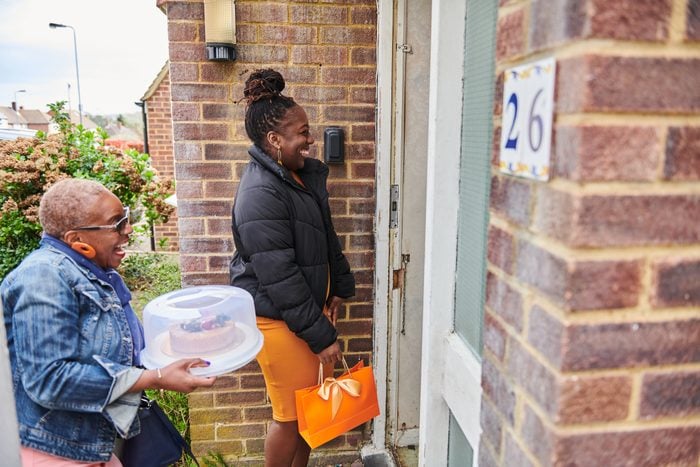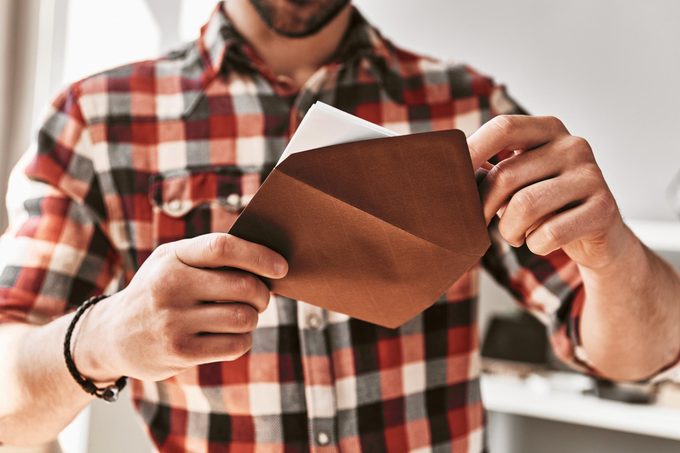This One Habit Will Make You a Better Houseguest
Updated: Nov. 30, 2023

Follow this etiquette expert's genius two-minute tip to ensure you're invited back time and again
Being a guest in someone else’s home can be a lovely experience. But being a thoughtful guest depends entirely on the good etiquette you practice. I’ll never forget one year when we stayed with a close friend, my then-2-year-old decided that the newly decorated guest room would be the perfect place to showcase his poop-painting skills. (Parents who travel with toddlers deserve a medal, honestly.) I went from ecstatic to see my friend to wanting to melt in the ground and disappear. How could I have let that happen? Toddlers are as devious and sneaky as they are adorable, but still, it was on me. I knew how to be a good houseguest, and I had failed in the worst way.
My friend was gracious, and I got everything cleaned up and sanitized, so the visit wasn’t entirely ruined, but since then, I’ve thought a lot about what it means to be a good houseguest. But aside from helping around the house and not smearing feces on the walls, there are some less-obvious habits you can practice to be the best houseguest possible—and one, in particular, that makes all the difference.
“It really is the little things that matter,” says etiquette expert Jan Goss, the founder of etiquette consulting firm Show Up Well. Here’s how she wins the “best houseguest” award.
Get Reader’s Digest’s Read Up newsletter for etiquette, humor, cleaning, travel, tech and fun facts all week long.
One simple habit to be a better houseguest
Goss says the one thing she always does when she stays in someone else’s home is leave a thank-you note. “I carry a baggie of small thank-you cards in my purse, and I always leave a thank-you note on the bed or dresser when I leave.” If she doesn’t have a thank-you card handy, she mails one to her host within 24 hours of her departure.
“It only takes a few minutes, and it ends your stay on a high note,” she says. “It’s a lovely surprise for your host. Everyone loves to be appreciated.”
Writing a thank-you note to your host doesn’t need to be overly long or complicated either. Goss recommends starting with something like “Thank you so much for your generosity and hospitality,” then including one or two specific things that stood out to you—perhaps a happy memory of playing a game or a delicious meal shared together. Share how much the host’s friendship means to you, and close the note warmly. Or you can personalize one of these thank-you messages to show your appreciation. You can even leave the note with a small hostess gift, like a treat or souvenir from your home state.
Top tips that will make you a great houseguest

“The bottom line is to treat their home as you would want yours to be treated—and perhaps even a little better,” Goss says. People simply want their houseguests to be polite. In fact, a 2023 survey by Preply asked more than 1,000 Americans in every state to share the best and worst things you can do as a houseguest. The top answers included asking if any help is needed (20%) and helping to clean the kitchen (17%). Who doesn’t love a little assistance when cooking dinner or doing the dishes? Here are some other ways to show your gratitude for your host.
Ask before entering a space
According to Goss, just because they are sharing their home with you doesn’t mean they are sharing their whole home with you. If you want to go somewhere other than the main common areas or the room you are staying in, simply ask. “A lot of etiquette boils down to asking for permission first,” Goss says.
Leave as planned
The trip is going so well you want to extend it a couple of days? Think long and hard about that. Extending your stay (without a specific invitation to do so) is an etiquette mistake. Even people who really enjoy being together may crave the return to normalcy, and it’s best to stick to your agreed-upon plans. “Better to leave when everyone’s happy than to overstay your welcome and end it on a bad note,” Goss says.
Prep children in advance
Learn from my mistakes and Goss’s experience (she has raised more than 50 foster and biological children!). “Before I stay anywhere, I always teach my children ‘hands to self,'” says Goss. “If you just tell them ‘Don’t touch anything,’ it starts things out on a negative note. ‘Hands to self’ is a gentle reminder to ask before touching other people’s things.”
Once there, remember that the home is likely not child-proofed, and always keep an eye on your little ones. If they break or dirty something, clean it up immediately and do whatever you can to make it right.
Bring your own specialty foods
Are you on a special diet? Gluten-free? Vegan? Keto? Many people have dietary restrictions these days, and it’s unfair to expect your hosts to cater to your specific dietary needs. Bring some snacks or foods you can eat, and offer to prepare them yourself at mealtime. Your host may offer to accommodate you, but you should still offer to pay for any specialty food items they buy and help cook and clean. If you have a serious allergy, always let them know well in advance of your visit.
At the end of the day, having good manners isn’t about following a strict set of rules, says Goss. “It’s about showing compassion, kindness and empathy for others.” Following these expert tips will ensure you’re welcomed back for years to come.
About the expert
- Jan Goss is the CEO and founder of etiquette consulting firm Show Up Well, which provides training in all areas of etiquette. Goss focuses on a common-sense approach to etiquette that blends protocol with kindness. She has authored two books on the subject: Protocol Power and Bedroom Etiquette.
Source:
- Preply: “Revealed: 2023 holiday etiquette guide in each state”



